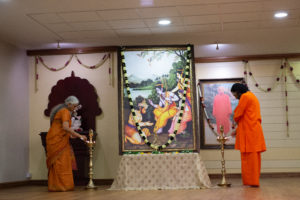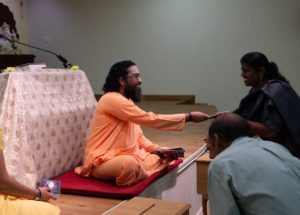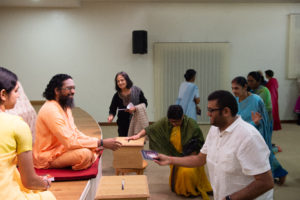Talks on ‘Ayodhya Kand’ – Part 3 – May 2019
Talks on “Ayodhya Kand – Based on Valmiki Ramayana” – Part 3 – by Swami Abhedananda
(Gyan Yagna conducted from 1st May till 3rd May, 2019)
Key Points from the Discourses
Day 1
The monthly gyan yagna had a beautiful beginning yesterday as Swami Abhedanandaji described that all things & situations in life have one very essential underlying component called as ‘thought’ and Valmiki Ramayana is the treatise to tell us which thoughts are important to cultivate and hold on to, and which thoughts are highly unimportant and should be discarded.
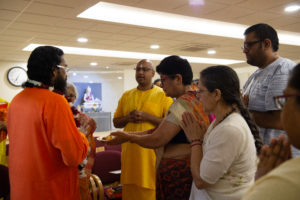 We share the summary of first day’s talk for our online audience (below is only the first part, stay tuned for the next part):
We share the summary of first day’s talk for our online audience (below is only the first part, stay tuned for the next part):
The most essential ingredient – Thought
- We enjoy and suffer with regard to many things in life; from what we have or don’t have. But what we have to understand is that in anything we enjoy and suffer, we mix in one important aspect and that is the predominant thought in our mind.
- It is through this ingredient called ‘thought’ that we experience good, bad, worst, wonderful, beautiful etc. And therefore, scriptures have laid too much emphasis on what is our thought.
- You don’t taste a situation per se. There is nothing called: ‘only taste of situation’. The situation itself is not good (or bad). It is because of mixing of your thought with situations, that it appears as a good (or bad).
- You mix what you have. What you don’t have, you don’t mix. So it is very important to understand which thoughts are very essential to have, and which thoughts are a liability for us.
- Every thought has its own nature. Like fire has its own nature and water its own. Fire if you touch it will burn, Water if you touch, it will wet. The thought of gratitude has one nature, the thought of non-gratitude has another nature. The thought of selflessness has one nature, the thought of selfishness has another nature.
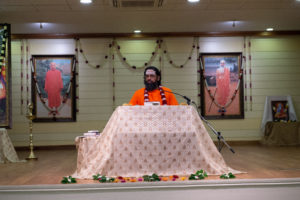 Outer Situation v/s Inner Thought
Outer Situation v/s Inner Thought
- We fail to see ‘thought’ as an asset in our life. And therefore when difficult situation comes, if the thoughts are not of high quality, then we are broken.
- Corresponding to each situation, a certain thought is required, and if that thought is not there in us, we will feel incapable to handle the situation. But if we have the right thought, then we can easily handle it.
- Bhagavan Ram’s situation was not good when He was told to go to exile for fourteen years and that too for no fault of His. But He had a very strong thought of tyaag (renunciation) & vairagya (dispassion). These thoughts were so strong that He could give-up the whole kingdom in no time.
- If Bhagavan Ram did not have the thought of Pitra-bhakti and Matra-bhakti, devotion to His mother and father, the situation of exile would have been very big and difficult for Him.
- If Bhagavan Ram didn’t have thought of dharma and tolerance, sleeping on the floor would have been very difficult.
- If Bhagavan Ram did not have thought of egoless-ness, then getting dressed in the bark of a tree, taking the attire of a muni and walking barefoot would have been very hurtful for Him.
- When Kaikeyi told Ramji that it is because of Him that His father was in a bad state, Ramji said, ‘I think I have done some bigger mistake. For this small reason, my father need not be so sad. Why didn’t you call me earlier. It’s a very small matter for me.’ The thought of gratitude pervaded His mind. The thought that ‘I don’t need the Kingdom to make me happy,’ pervaded His mind. Bhagavan Ram’s thoughts were extremely beautiful and exalted at all times.
- So it is not that a situation is very powerful, but it is our thought that creates an image about the situation, and that image about the situation gives us sorrow or joy.
- We never pay attention to what we have inside. Our whole life goes in accumulating something outside (wealth, name, fame, people etc.). Our inner wealth is our right thoughts, and we need to shift our attention towards it.
- When we go through Valmiki Ramayana, there are a lot of stories and characters. Each character is a personification of a particular vritti or a thought, and thus through each character, a thought is being put in our mind.
- Even if one right thought is missing in a person, it can create havoc in his mind; he doesn’t need another hell. In Vedant, it is called ‘Adhyaatmik Narak’.
- If Kaikeyi had simply thought that “There is no distinction between Ram and Bharat. Ram is as good as my son”, then everything would have been just fine. Only this thought was required. The cause of Bhagavan Ram’s exile was nothing but ‘Bhed budhhi’ (sense of separateness) that came in Kaikeyi’s mind; the vritti of ‘mine’ & ‘not mine’.
Character of Mother Kaushalya
In Valmiki Ramayana, Bharatji uses the below words to describe Mother Kaushalya:
- Dharma-rataha: Mother Kaushalya always abided in dharma. Dharma means doing something which will bind the mind, which brings confidence in the mind, which makes one feel independent. Dharma-rataha means doing that by which one knows that his future is good, doing something to bring bigger thoughts in the mind.
- Dharmagyaha: Dharmagyaha means Kaushalyaji knew what is right, what is wrong, what is dharma, what is adharma, what to speak, what not to speak. One should know what thought and what action will restore peace inside; what attitude will give more disturbance; what bhaav will make the mind inspired to do good things. Such a person becomes non-vulnerable or unbreakable.
- Dharma-vadini: Kaushalyaji spoke what is dharma. One should speak the truth, but one should not hurt anybody. Whatever is in your mind, don’t just blurt it out. Put some sweetness, some joy, some depth and some scriptures into it, and then say something good.
Character of Kaikeyi
In contrast to Kaushalyaji’s character, Bharatji uses some negative words to describe his own mother, Kaikeyi:
- Aaptkaama: Who always tries to find his/her own way. The only attempt of such people is to get their work done, by hook or by crook. They don’t consider others; wherever they go, they try to fit their own agenda, their own plan.
- Sada-chandi & Krodhana: Kaikeyi was quite violent and angry too.
- Praagyamaanini: Kaikeyi used to think that she was very intelligent. That means she was not subject to correction. If you don’t know that you don’t know, then no one can help you. So one should know correctly what he does not know.
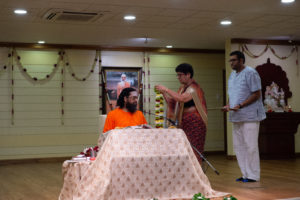 Shri Bharatji’s beautiful character
Shri Bharatji’s beautiful character
- Valimikji says about Bharatji that inside he was Dyutimaan; outside he was Veeryavaan. Veeryavaan means full of valour. Dyutimaan means he had a lot of dignity. He had tej (luster) and had a very graceful appearance.
- When a person is not subject to falling prey to any thought, then he is called Dyutimaan. More a person masters his mind, more his thoughts are higher. Shri Bharatji’s mind was always pervaded by higher thoughts.
- Valmikiji calls Bharatji as ‘Dharmatma’. Dharmatma means one who doesn’t have to struggle with his mind, who doesn’t have to fight with his mind to get out of a certain thought. When you do sufficient dharma, your mind becomes very conducive to you. Such was Bharatji’s mind.
- When Bharatji heard the news of Dashrathji’s demise, he was so sad, he collapsed on the ground. He was distraught, as he loved his father, and his father also loved him very much. A person should have emotions also. Crying is not bad, please understand. Now-a-days people say, ‘he has become emotional’, as if becoming emotional is a bad thing!
- In anything, unless we mix emotion, it will become dry and useless. If you can’t work with emotion, you can’t bring out the best in you. For instance, if we don’t listen to satsang with emotion, we will not enjoy the katha of the Lord.
- While consoling Bharatji, Kaikeyi uttered a beautiful shloka about the character of Bharatji:
- Daani: She said Bharatji was very good in doing charity. Charity is the emotion in which one feels he will be happier after giving.
- Sheel (Joy giving conduct): Sheel means one who has good and pleasing conduct. A person with sheel is never harsh or hard towards others. We feel like spending time with only those people who have sheel because one feels secure in their company.
- Shruti-vaconugaa: This means Bharatji was the one who followed the teachings of the scriptures. He was also the one who had a strong tap-buddhi (ability to perform austerities) and also sam-buddhi (a very balanced mind).
Bharatji’s intense feeling of being Lord’s servant
- While talking to Kaikeyi, Bharatji referred to himself as Daas (servant) of Ramji (daasosmi). Softness of a person is his ability to become small. Small means, not physically small. Small means, “my desires are very small and I will drop my desire in front of you!”
- Anybody is a difficult person because he cannot drop his desire.
- Our desires won’t work anyway, so best is before your desire is crushed you surrender to the Lord.
- Bharatji felt, “I am the beloved servant of Ram”. He didn’t feel “I am the brother of Ram and therefore I have rights just like him”. Bharatji never tried to assert his right.
- Moment you talk about your right, you will go wrong. This is the rule! You will always feel: what right I had, I didn’t get it. And moment you feel like that, you will feel victimized. All troubled people are those who are trying to assert their right.
- When you think you are a servant, you are giving up your right. This is called karma-phal tyaag (renunciation of fruits of actions).
- Surrendering means being available to be ruled. Happiness can come only when you learn to become a puppet of someone higher.
- Moment you live your own life, it will create a lot of problem. We should go to Bhagavan and say “Oh Bhagavan, I want to live the life that you want from me. I want to become your daas, your servant.” When we feel we have no option other than the Lord, and we are ready to do anything which the Lord commands, we become a true servant of the Lord.
- Bharatji says, “Pita hi bhavati jyeshtah”: Elder brother is like a father, I will go and hold His feet. He is my support. This should be our bhaava too towards the Lord, “He alone is my support!” We can’t expect another jeeva to be our support as he himself needs support. Nobody else can be our support other than the Lord!
Day 2
On Day 2 of the yagna, Swamiji delved into the psyche of the jeeva, exposing our most persistent errors in thinking, and how these lead to our own misery. Then, Through Bharatji’s unparalleled character, Swamiji explained how to break the chains of the delusions we cling to, how to surrender in total humility to the Lord, and how to win His infinite grace in our lives.
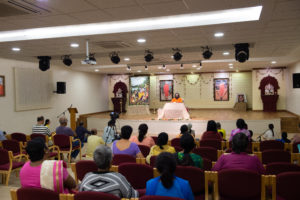 Actual life Vs Life we dream of
Actual life Vs Life we dream of
- Often, we find we are living the life we didn’t want to live. And we are unable to live that life which we really wanted to live. Unless we understand the reason for not having that expected life, we will keep making mistakes.
- The core reason is our denial to live as per the laws of the God.
- There are certain laws in the cosmos which cannot be changed. A thousand years ago, gravitational law was there and today also it is there, it does not change with time. Laws made by God don’t change. Similarly there are certain unchanging laws of life which we fail to recognize, and that is why we keep getting ourselves into trouble.
- Shri Bharatji’s character is a very beautiful demonstration of how one should understand and follow God’s laws.
What is it that we keep chasing?
- For the majority of us, it is true that we do most of our work for our ahankaar (ego) or for our attachment.
- We have an insatiable thirst to see ourselves as higher and bigger. We strive to maintain our ahankaar (ego), and at the same time we want a bigger ahankaar. Ahankaar means – we want to have bigger rights in life. This is why we go for a better job, bigger house, more expensive car etc.
- Second problem is – we want to possess somebody. We want at least 3-4 people whom we can say ‘she is my wife, he is my son, he is my husband’ etc. And this is why we have a family life, social life etc.
- Thus, the two main sources of joy for everybody are:
- Ego: I want to be seen as bigger and better than others.
- Attachment: I want to possess more and more people, objects, luxuries.
And we keep chasing these two thinking that it is very natural to do so. But in reality, these two alone become the biggest source of sorrow in our life.
Why is Ego considered as a big cause of sorrow?
- Life is not meant to keep nurturing your ego because whatever bigger aham (identity) you want, you won’t get it. The bigger “I” you want through somebody, or through some position, you will not get it. This is the law.
- People will give an identity but not that identity which you want. Even if they give, they will give for a short time only. And who will give identity to you, it depends on them, it doesn’t depend on you. Then, to make matters worse, sometimes the person who was giving you a good identity, he suddenly takes away that identity.
- Anybody who is sad, he is sad because he is not getting the identity which he wanted from somebody, or from the office, or from the system, or from his own prarabdha.
- We repeatedly fail to realize that we are never going to get the identity that we want from the world. This is one of the rules of God.
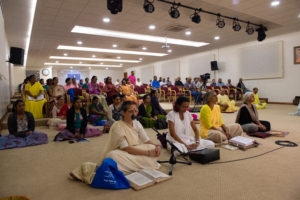 Why is Attachment such a terrible poison?
Why is Attachment such a terrible poison?
- Attachment means that the thing or person whom you are attached to, that is a big source of joy for you, and you want him for yourself exclusively. This creates the thought that: ‘My joy is dependent on you, if you are not there my joy will go away”.
- When you have such my-ness, the problem is – either you are already sad or you will be sad. There are only these two possibilities, there is no third possibility. No person or object here is truly yours who you can call ‘mine’.
- The reason for sadness is that the object or person whom you are attached to, that won’t be under your control. Any person, object, house, car, money, even this body, cannot remain with you forever.
- This is all our false mental creation that the house, or car, or children etc. belong to us and that they are a source of joy for us.
The Solution, through the character of Shri Bharatji
- Both the notions of ‘I-ness’ (ahamta) and ‘My-ness’ (mamta) are very, very false notions, and they are the biggest cause of sorrow in life.
- More you understand that these two things are your problem, more Shri Bharatji’s character will touch you.
- There is only one way out of these and that is to develop ‘Samarpan’ vritti (thought of surrender). ‘I am very small in front of my Guru, God, I have no desire to become big in front of God’. This desire to be small, to be insignificant is the samarpan vritti which Bharatji had.
- Would such a person have no ambition whatsoever? No, he may be ambitious, he may go and apply for a big job, but that would be not to prove himself big, but to prove to himself ‘I can serve in a bigger manner also’.
- The tendency to show, to seek, to get identity, this is the self-killing instinct of a person.
- Bharatji had the attitude ‘Daasosmi sammatah’ – ‘I don’t want to become big. Nobody should see me as big.’ This is the essence of character of Bharatji. And without this attitude, our problems of ‘I-ness’ & ‘My-ness’ won’t be solved.
What should we want?
- Our want should be, “God is very big in my life and I just want to be near Him!” Does this mean that we should not take a bigger role? No, you take a bigger role but be a representative of God in that bigger role. Have the bhaav that – ‘In that bigger role, bigger is the God, I am just a tiny dot at His feet.’
- Difference between a humble person and an arrogant person is this only: that a person who is having ahankaar (ego), he has a tendency to see himself as more respectable. A humble person has no such desire. He only wants to see God as respectable.
- This is the essence of Shri Bharatji’s character. One should imbibe it. It will make life simpler; perspective clearer.
- World is not meant to get attached to anyone. Then whom shall I posses? Say to God ‘I am yours!’ Don’t have independent relationship with anybody. You will not be able to maintain the relationship; it will become a heavy load on your heart. Then how shall I treat my son, daughter? Treat them as God’s children and you just be the care-taker of God’s children.
- If you don’t bring God into your relations, those relations will eat you in due time, and you will become worried, anxious, attached and possessive – all these words in the superlative degree. This is the truth!
- Gravitational law doesn’t change, and neither does this law. All sad people are those who are not accepting certain laws of the Lord.
The superlative teaching that is Shri Bharatji’s character
Bharatji’s character shows that the two things: I-ness and My-ness, were absent in him. Let us see the demonstration of these truths in Shri Bharatji:
- Bharatji after finding out about his father, asked Kaikeyi ‘Where is Ram? Where is Lakshman? Where is Sitaji?’ Out of deluded joy, Kaikeyi said, ‘Along with Sita and Lakshman, I have sent Ram, into exile’.
- Bharatji got a shock. ‘What? Forest? Why?’ When Kaikeyi told the story in more detail and said, ‘For you only I did all this manipulation,’ Bharatji was devastated. He got very, very angry. Bharatji’s nature was not to be angry and so this is the only instance where he gets angry and says very harsh words to Kaikeyi. He said, ‘Paapini! Cruel!’ He didn’t call Kaikeyi ‘mother’, he took away the ‘mother’ word.
- One of the causes of Bharatji’s anger was his deep love for Bhagavan Ram. His anger had no ego or hate in it. The foundation of his anger was devotion for Bhagavan.
- Please note, when an ordinary person becomes angry, it is because of his ahankaar. Our anger is ego-oriented or hate-oriented. We are angry when we don’t get recognized or we are insulted.
- And the second, beautiful reason why Bharatji was angry is that – he felt that Kaikeyi was too attached to him, and therefore she left Bhagavan Ram. Bharatji thought, ‘If I say something very harsh to her and I stop talking to her, she will naturally get detached from me and will again go to Bhagavan.’
- Bharatji was maha-saadhu. A sadhu wants that others should be attached to God. This concept was paramount in his mind.
Anger with a difference
- Generally, when we are angry, we talk non-sense, we talk too much, our language becomes cheap and we lose grace. But Bharatji even in anger did not talk non-sense, his words were highly deep. Bharatji’s anger was out of deep love and devotion towards the Lord.
- Bharatji reprimands Kayikeyi saying, “How can you send that sinless Ram to forest who always smiles seeing us; who always greets you and prostrates to you? I will see that he comes back. You know that everybody loves Him so madly. I will bring him back and I will become His servant!”
- If we could be angry like Bharatji for the reason ‘why I caused displeasure to the Lord’, we will become seekers! For a seeker, his wrong thinking, attachment and aversion gives him tremendous pain, and that becomes an inspiration for his sadhana.
- Only when we are hard towards our negativity, we can be soft towards our divinity.
- Bharatji was very, very soft. Somebody is soft when they cannot tolerate Lord’s displeasure even for a moment. Your softness can be measured with regards to how soft you are to your inner God, how soft you become when you do puja or japa, how soft you become when you are with your Guru, how soft you are when you are thinking about God.
- You cannot be soft towards both, ahankaar & God. If you are hard towards your ahankaar, then only you can be soft towards God and Guru. If you are soft towards your ahankaar, you will be hard towards God and Guru. And therefore our spiritual progress is slow, because we are very soft towards our ego.
- Loving means becoming extremely soft in front of your beloved.
Imbibe Mahatma like qualities
- Valmikiji through Bharatji’s sublime character is teaching us the qualities of a Mahatma. Bharatji is a Mahatma, because he never brought his small self into calculation. The moment we bring our ego into calculation, our analysis about any subject or issue becomes completely wrong.
- In any situation, the moment we think, ‘what I am getting’, or ‘what I am losing’, we will be in trouble.
- Mahatma is the one whose only focus is, ‘whether God is pleased with my action & intention, or not’ – Full stop! Nothing else.
- The only way to live life beautifully is, not to push our own will. We must align our will with God’s will! ‘May the Lord’s will alone prevail. If God wants to make me poor, I will be poor. If He wants to make me rich I will be rich. I am living only for Him!’
- The moment we say, ‘I am living for my son, for my husband, for my wife, for office, etc.’ they will become the source of our sorrows and joys.
- When we have gotten everything from the Lord, then we should give everything back to Him alone. We have to worship the Lord through the people around us!
Day 3
On Day 3 of the Valmiki Ramayana yagna, Swami Abhedanandaji took us ever closer to the Lord, by systematically disenfranchising our small ideas of personal joys and sorrows, and leading us to that one divine fact: to live for Bhagavan’s joy ALONE, is the way to our own joy.
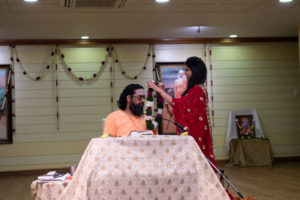 Whose joys and sorrows do we live for?
Whose joys and sorrows do we live for?
- We find a lot of charm in living our own life. We want to do and enjoy whatever-wherever we want. But we fail completely to understand one simple fact that – jeeva is not meant to live his own life!
- When a person is working for his own sorrows and joys, he is trying to live his own life, which he can never live. Life is not meant to execute our plans, and go through our own sorrows and joys. Life is meant to live somebody else’s life. The question is, whose?
- Whose joys and sorrows shall we be happy and sad with? Lord’s joys and sorrows!
- If it is difficult to identify with Lord’s joys and sorrows, then best is that we have some Guru or saint whose joy & sorrow we can identify with. But it needs a lot of punya to get somebody Higher for whom we have such a bhaav and with whom we have such identification
- Identification with somebody means – his joys become my joys, his sorrows become my sorrows. My own sorrows and joys have no meaning.
- Moment we possess our sorrow, and possess our joy, problem will be that we will become vulnerable. We will have insistence that a particular person/object should be with us or should not be with us, otherwise we won’t be happy. We as if sign a ‘dependence contract’ with the other person unconsciously.
- We particularize our life to such an extent, that a single person or object can cause havoc in it. This is our fundamental mistake. We crystallize ourselves.
- We may lose money but that is not a problem, problem is that we develop a personality that ‘I have lost money, therefore I am sad, I am unhappy’. With this thought, you develop a source of unhappiness, you develop some kind of inner abscise.
Shifting the compass of joys and sorrows
- De-personification of our joys and sorrows is called sainthood. Shri Bharatji’s character illustrates this principle.
- Bharatji’s life says – if you have to be happy, be happy for God and Guru, and if you love God and Guru, then let yourself dissolve so much that your personal happiness and sorrow don’t matter at all.
- If you have to be sad, be sad with the thought ‘Why God is not happy? Why I could not do my japa & puja?’ When you are sad for an ego-centric reason, that sadness is going to trouble you a lot.
- There is no need to be sad for your personal loss. Accept it! Think that ‘God’s will is there. In His happiness, I am also happy’. The joy of the Lord’s will being fulfilled should be bigger than the sorrow of our personal loss.
- There is something called ‘Lord’s joy’. How do I know? You will know in your heart. You do some action, and inside a report comes immediately, ‘you did good or bad’.
- a) When you do wrong, you will realize that there is some upset God in you from whom you can’t run away. The day you start recognizing his sadness, is the day you will start living for His joys.
- b) When you do good, there is someone inside who says ‘Good! I am feeling happy.’ When you start seeking compliments from inside, you become a seeker.
- When you become sensitive to this God’s sorrows and God’s joys, by God’s grace, you become a saint like Shri Bharatji.
- Life is not difficult because situations are difficult. Lack of money, or people around are not the issue. The issue is – we never identify with the joy of God and sorrow of God. Unfortunately, we are very fond of being sad and happy about our own personal things.
- How should our attitude be? “Lord’s joy and Lord’s sorrow are biggest in my life. My sorrows and joys, my success and failure, my honor and dishonor are very small issues.”
- This is what Bharatji’s personality demonstrates. We saw how distraught Bharatji was when Kaikeyi told him she had sent Ram, Lakshman and Sita into exile. The cause for Bharatji’s sorrow was the pain he had when thinking about the hardships that Bhagavan Ram, Lakshamji and Sitaji would be going through in the forest.
- Unless the desire of wanting Lord’s joy is not there in the heart, a person is very shallow.
- If you mix sugar in the water and stir it to the point where sugar dissolves, you can’t see sugar particles separately in the water. A devotee is like that – his personality, his sorrows and joys dissolve so much in Lord’s sorrows and joys that he doesn’t even see his sorrows and joys clearly. He may feel it, but it’s not very important for him.
- We have to make a habit of this. If somebody says some bad words, go inside and call Lord, ‘What do you want? I accept it. If you want he should say some bad words, let him say more.’
‘Lord’s happiness is most important for me’ – this is what we should all be training for, by learning from Bharatji’s diamond of a character.
Beware of your inner Manthara
- Unfortunately, instead of learning from Bharatji, we seem to have Manthara for our teacher. Our own petty joys and sorrows, position and self-importance are so meaningful to us, that the Lord has no meaning in our life.
- Let us look honestly at the Manthara in us and pray to the Lord that we have His grace to become students of Bharatji’s character, and surrender our inner Manthara once and for all at His compassionate feet.
- Kaikeyi represents ‘kriya shakti’ – the power of activity, and when Kaikeyi was given by her father to Dashrathji, he also sent Manthara to Ayodhya along with Kaikeyi. Manthara represents the sense of difference – ahankaar. She represents the attitude ‘What will I get? Why others are getting and I am not getting’, all these selfish understanding is the Manthara associated with all action.
- Therefore, the moment we enter into this area of action, there is a lot of trouble, as we tend to evaluate, what will we get in return. This constant evaluation makes a person very hard, meaning, he is unable to give joy to others; he seeks joy only for himself. Also it is likely that he develops liking for somebody (who are conducive to him), and dislike for somebody (who are un-conducive).
- This is because Manthara is behind every action and her only work is to send Ram to exile. She wants that the Ram and Sita who are in us, that knowledge and peace which is in us, are thrown out. She only wants that her rule should prevail.
Manthara should be punished
- ‘Activity’ represented as Kaikeyi is not the problem. Kaikeyi miss-guided by Manthara is the problem. Action is not a problem, you can act a lot. But your action should be guided by Bharatji and not by Manthara.
- Don’t become Manthara; otherwise Shatruganji will beat you. Shatruganji is seva bhaav. Seva bhaav kills this Manthara or atleast it makes her ineffective.
- Dharma and seva bhaav is the attitude that, ‘I am meant for God; I am meant for serving the saints.’ This is the bhaav of Shatrughanji. His bhaav was that his life was for serving a saint, nothing else.
- This Shatrugan bhaav beats that Manthara and she deserves to be beaten. So that she is does not send our inner Bhagavan into exile again. We should make sure that we don’t obey the Manthara in us.
- After the performance of last rites of King Dashratha, the ministers expressed their desire to coronate Bharatji. Bharatji, was however distraught at the thought of being coronated. Such was his devotion, tyaag and bhaav for the Lord.
- Bhagavan Ram alone was important for him and his personal glory was not important at all.
- If Bharatji was a bhogi (indulgent) and ahankaari (egoistic), he would have been very happy. He would have accepted the proposal of becoming the king but all he wanted was to bring Bhagavan Ram back from the forest.
- In the guise of Dharma, we generally fulfil our vasanas. Devotion is the extreme thirst of giving joy to your beloved and having non-tolerance to his pain.
- Bharatji took the soul of Dharma and not it’s skeleton. We should also take the essence of Dharma and not hold on to something rigid. Dharma is not for bhog and compromise. Dharma is to teach us, how to renounce our insistences, likes, dislikes and ahankaar.
- Bharatji wanted to stay in the forest on behalf of Lord Ram for 14 years. The soul of love is ‘sacrifice’.
Discover Bharat the lover of the Lord in you
- A person is defined as, whom he lives for, whom he loves.
- You are known by what pain you have. Centre of your life is what your pain is. If you have pain because of your wife, you have a ‘wife centred’ life. And if you have pain because of your mother-in-law, you have ‘mother-in-law centred’ life. If you have pain because of money matters, you have a ‘money centered’ life.
- What you did not get or what you are not able to do, that is your pain.
- When you have pain for God, that is ‘God centered’ life and there you will start searching joy from. If you have pain that, ‘I should serve my Guru more,’ you have ‘Guru centered’ life. A good disciple is one who has a pain to serve more.
- Everybody has a pain, find out where is your pain. Otherwise everything will be in vain.
- We are essentially lovers. But make sure that you don’t become a lover of small things. That is a superficial personality.
- Be a lover of the highest. Seek the one to love, who will not leave you. I want to love the one who is biggest, who is purest, and who is most divine.
- There is a Bharatji hiding in us also, bring him out. Life belongs to those who don’t live for themselves & life is lost to those who only live for themselves.



